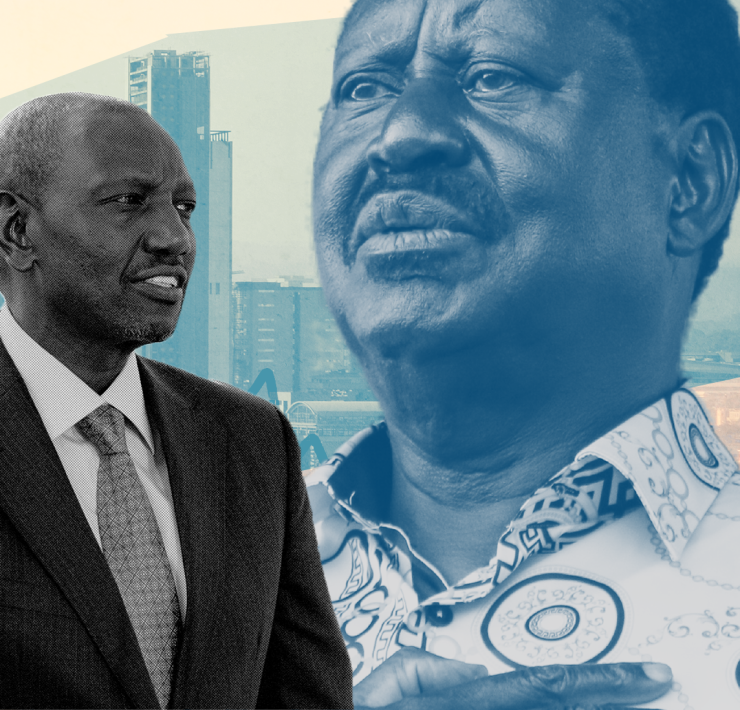Among the demands that the Azimio la Umoja One Kenya Coalition Party (Azimio) made in its call for protests against government inaction, the one that was most likely to “set” the negotiating table was their call for a more broad-based process of selecting nominees to the Independent Electoral Boundaries Commission (IEBC).
This is the issue President William Ruto said he is willing to discuss with Azimio leader Raila Odinga in his speech to the nation on April 2. Ruto asked Odinga to call off protests that were set for the following day. Odinga obliged, with conditions.
As matters stand, the IEBC cannot make any major decisions or hold any election because not a single Commissioner is in office much as the electoral agency’s secretariat is fully constituted, led by CEO Marjan Hussein Marjan who has been in charge since March 2022. But the secretariat only implements decisions made by Commissioners. The secretariat cannot, for example, set an election date if a Member of County Assembly, MP, Senator or Governor vacates office for whatever reason and a by-election is required.
In short, our electoral process is on stand-by mode.
The first of the seven-member commission to leave office were Vice Chairperson Juliana Cherera and members Justus Nyang’aya and Francis Wanderi who resigned between December 2 and December 8, 2022. They resigned rather than face a tribunal appointed by Ruto to investigate their conduct during the August 9 General Election. Next followed Chairman Wafula Chebukati and members Boya Molu and Abdi Yakub Guliye, who completed their single six-year term on January 17 this year. The last Commissioner to leave office was Irene Masit, when a tribunal investigating her conduct during the August 9 General Election recommended her dismissal on February 27. Ruto accepted the tribunal’s findings and dismissed Masit.
But before Masit was dismissed, she remained the only Commissioner in office between January 17 and March 1, the day she was dismissed. One Commissioner cannot make a quorum and so vacancies were declared in the Commission and the process of appointing a selection panel began. Azimio has argued that recent changes to the law on how such a panel is selected was skewed to favour the government. Azimio argued this was done so that the selection panel chooses IEBC nominees who could be manipulated by the government.
The deadline for applications to be a Commissioner or Chairperson of the IEBC was March 28. The selection panel had received 920 applications by the deadline. The selection panel would have only just begun sieving through the applications to determine whether they satisfied the minimum requirements before the demonstrations were called off on April 2. It is possible the selection panel’s work could be put on pause without causing much inconvenience for those involved. This shows that even though the issue of reconstituting the IEBC is what has brought the government and the opposition to the negotiating table, it is not without complications.
The other issues Azimio raised during the protests are not issues that they and the government can easily agree to negotiate, or they are issues that are not in their purview to negotiate.
Take the issue of “opening the servers”.
The IEBC is the custodian of the servers Azimio wants “opened”. Only the seven members of the IEBC can “open the servers” if they are so minded. There is no IEBC Commissioner who is in office. How then can the servers be “opened” as demanded by the opposition without violating the Constitution and the law that governs the work of the IEBC? Surely, Azimio, which has consistently attacked the government for violating the Constitution on a number of issues, does not want the government to violate the Constitution on this issue simply because it suits Azimio’s agenda?
As for the cost of living, Azimio knows there is no easy answer and whatever measures that can be taken to bring down the cost of living will not have effect immediately. Azimio leaders have talked about reinstituting the food subsidies the Uhuru Kenyatta administration implemented in July-August last year. That one-month, two-month experiment was shambolic.
At the time, the aim was to have a two-kilo packet of maize flour sell for KSh 100. This was as much as KSh 100 lower than what a non-subsidised maize flour packet was going for. The problem is the supply of the KSh 100 maize flour packet was erratic at best. Instead of helping make life a little more affordable, the average citizen was forced to develop an intelligence network to know where and when the next batch of KSh 100 maize flour packets would be available. Whatever savings one made buying the 100 bob maize flour packet was spent on the cost of phone calls to find out where and when the consignment was available. Those savings were also spent in the time people used lining up for at most, two packets of maize flour.
This is even before one gets into the question of why millers were not able to adequately supply the KSh 100 maize flour packet. And the so-called food subsidy of July-August last year only covered the cost of maize flour. It did not cover other food essentials.
The Ruto administration has touted its solution to lowering the cost of living is better than the food subsidy of mid-last year. The current government has argued that lowering the cost of producing maize is a more sustainable way of addressing the high cost of living. The Ruto administration believes a subsidy on the fertiliser farmers use will help reduce their cost of production and lower the price of maize. The impact of this solution will only be clear after the next maize harvest, which is months away.
The high cost of living is an issue that affects us all. It is the issue that drove support for the protests Azimio called. Unfortunately, there is no easy, quick solution to it.
Author
-

Tom Maliti has been an editor and reporter with mainstream and niche media outlets. He is multilingual and is comfortable writing on any subject whether it is international justice, international trade, diplomacy or about an election or music, film, theatre or a book. Most recently, he was a trial monitor for about 10 years with the International Justice Monitor (www.ijmonitor.org) where he wrote about several cases before the International Criminal Court (ICC). Among the ICC cases Maliti reported on were that of Uhuru Kenyatta and the trial of William Ruto and former journalist Joshua arap Sang. During these proceedings, Kenyatta was President of Kenya and Ruto his deputy. Before joining the International Justice Monitor, Maliti was an East Africa Correspondent for The Associated Press. In this role, he rotated as the duty editor in the Nairobi Bureau, which was responsible for a network of reporters in 14 countries in eastern and central Africa. Maliti put his French to use when he was assigned to report on developments following two coup attempts in Chad (2006 and 2008) and that country’s 2006 presidential election. His multilingualism also saw him sent to report on the aftermath of the 2009 Yemenia Airways crash in Moroni, the capital of Comoros. Maliti cut his teeth as a journalist at The Frontier Post newspaper in Pakistan.
Tom Maliti has been an editor and reporter with mainstream and niche media outlets. He is multilingual and is comfortable writing on any subject whether it is international justice, international trade, diplomacy or about an election or music, film, theatre or a book. Most recently, he was a trial monitor for about 10 years with the International Justice Monitor (www.ijmonitor.org) where he wrote about several cases before the International Criminal Court (ICC). Among the ICC cases Maliti reported on were that of Uhuru Kenyatta and the trial of William Ruto and former journalist Joshua arap Sang. During these proceedings, Kenyatta was President of Kenya and Ruto his deputy. Before joining the International Justice Monitor, Maliti was an East Africa Correspondent for The Associated Press. In this role, he rotated as the duty editor in the Nairobi Bureau, which was responsible for a network of reporters in 14 countries in eastern and central Africa. Maliti put his French to use when he was assigned to report on developments following two coup attempts in Chad (2006 and 2008) and that country’s 2006 presidential election. His multilingualism also saw him sent to report on the aftermath of the 2009 Yemenia Airways crash in Moroni, the capital of Comoros. Maliti cut his teeth as a journalist at The Frontier Post newspaper in Pakistan.








